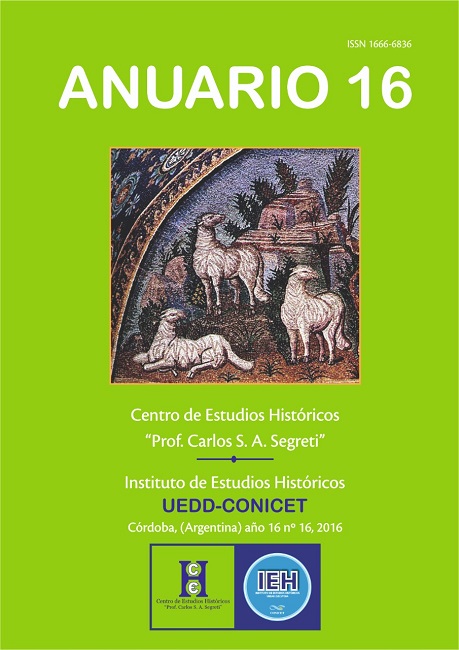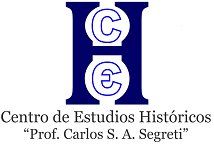Re-adaptation of traditions: the Spartan ancestral constitution in the Roman imperial era
DOI:
https://doi.org/10.52885/2683-9164.v0.n16.21922Keywords:
Sparta, Rome, patrios politeia, identityAbstract
In this article it is analyzed the continuity of the Spartan patrios politeia throughout the Roman imperial period. I study the identity of the Spartans, not only built by the Spartans themselves but also by the strong influence of Rome in the community, the key element for the continuation of many Spartan traditions.
Downloads
References
BEARZOT Cinzia, “Sparta agli inizi del IV secolo: un “sistema riformabile?”, Federica CORDANO, Giovanna B. GIANNI y Teresa. G. ALFIERI TONINI (eds.), La cultura a Sparta in età classica: atti del seminario di studi, Università statale di Milano, 5 - 6 maggio 2010, Trento, Tangram, 2013.
BIRGALIAS Nikos, L’odyssée de l’éducation spartiate, Atenas, Historical Publications St. D. Basilopoulos, 1999.
BIRGALIAS Nikos, “Nabis: un prince hellénistique?”, Víctor ALONSO TRONCOSO (ed.), ???????? ??? ?????????. La figura del sucesor en la realeza helenística, Madrid, Ediciones Complutense, 2005.
BOWIE Ewen L., “Hellenism in writers of the early Second Sophistic”, Suzanne SAID (ed.), [Hell ? nismos]: quelques jalons pour une histoire de l’identité grecque: actes du Colloque de Strasbourg, 25-27 octobre 1989, Leiden, Brill, 1991.
BOWERSOCK G.W., “Eurycles of Sparta”, The Journal of Roman Studies, 51, 1961.
BRELICH Angelo, Paides et Parthenoi, Roma, Edizioni dell’Ateneo, 1969.
CANDIDO Regina (orgs.), Caesar Augustus. Entre Práticas e Representaçoes, Rio de Janeiro, Universidade Federal do Espirito Santo.
CARTLEDGE Paul y SPAWFORTH Antony J. , Hellenistic and Roman Sparta: a tale of two cities, Londres, Routledge.
CASILLAS Juan Miguel y FORNIS César , “La comida en común espartana como mecanismo de diferenciación e integración social”, Espacio, tiempo y forma. Serie II, Historia antigua, vol. 7, 1994.
CUSUMANO Nicola, “Turisti a Sparta. Il passato che non torna e l’invenzione della tradizione”, Archivio Antropologico Mediterraneo, núm. 12 (2), 2009-2010.
DAVID Ephraim, “The pamphlet of Pausanias”, Parola del Passato, vol. 34, 1979.
DE ASSUMPÇAO Luis Filipe Bantim , “O Princeps Augusto e as relaçóes políticas com a sociedade espartana”, DA COSTA CAMPOS Carlos Eduardo y MARTINO Maria Luis M. , “Optime Romulae custos gentis... redi” Mos maiorum e imagen de Augusto en las Odas de Horacio”, Praesentia, vol. 9, 2008.
DESIDERI Paolo, “Lycurgus: the Spartan ideal in the age of Trajan”, Philip
Simon SWAIN, “Hellenic Culture and the Roman Heroes of Plutarch”, The Journal of Hellenic Studies, 110, 1990.
DOUKELLIS Panagiotis N., “Hadrian’s Panhellenion: A Network of Cities?”, Mediterranean Historical Review, vol. 22, núm. 2, 2007.
DUCAT Jean, Spartan Education: Youth and Society in the Classical Period, Swansea, Classical Press of Wales, 2006.
FLOWER Michael A., “The invention of tradition in Classical and Hellenistic Sparta”, Anton POWELL y Stephen HODKINSON (eds.), Sparta. Beyond the Mirage, Londres, Classical Press of Wales, 2002.
FORNIS VAQUERO César, “Bajo el signo de Licurgo: el reformismo atávico de Agis IV y Cleómenes III”, Espacio, Tiempo y Forma, Historia Antigua, vol. 28, 2015.
FORNIS VAQUERO César , “La basileía “revolucionaria” de Nabis”, Sociedades Precapitalistas, La Plata, Universidad Nacional de La Plata, vol. 5, núm. 2.
FORNIS VAQUERO César, “La imagen poderosa del pasado: la recepción de Esparta en el Principado romano”, Dionisio PÉREZ SÁNCHEZ, Manuel J. RODRÍGUEZ GERVÁS, Juan Ramón CARBÓ GARCÍA (et.al.), Poder y heterodoxia en el mundo greco-romano, Salamanca, Ediciones Universidad de Salamanca, 2017.
FUTTER Dylan, “Plutarch, Plato and Sparta”, Akroterion. Journal for the Classics in South Africa, vol. 57, 2012.
GRUNAUER-VON HOERSCHELMANN Susanne, Die Münzprägung der Lakedaimonier, Antike Münzen und geschnittene Steine, Berlin, De Gruyter, 1978.
HOBSBAWN Eric y RANGER Terence (eds.), The Invention of Tradition, Cambridge, Cambridge University Press, 1983.
KENNELL Nigel M., “IG V 1, 16 and the Gerousia of Roman Sparta”, Hesperia: The Journal of the American School of Classical Studies at Athens, vol. 61, núm. 2, 1992.
KENNELL Nigel M., The Gymnasium of Virtue. Education and Culture in Ancient Sparta, Chapel Hill, University of North Carolina Press, 1995.
KENNELL Nigel M., “The Spartan Synarchia”, Phoenix, 46, 4, 1992.
LÉVY Edmond, “La Sparte de Polybe”, Ktéma. Civilisations de l’Oriente, de la Grèce et de Rome Antiques, vol. 12, 1987.
KOURSOUMIS Sokratis, “Revisiting Mount Taygetos: the sanctuary of Artemis Limnatis”, Annual of the British School at Athens, vol. 109, 2014.
LUPI Marcello, L’ordine delle generazioni: classi di età e costumi matrimoniali nell’antica Sparta, Bari, Edipuglia, 2000.
LURAGHI Nino, The Ancients Messenians. Constructions of Ethnicity and Memory, New York, Cambridge University Press, 2008.
MARTINO Luis M., “Reescribiendo la moral de los ancestros. Las costumbres ¿intachables? De los maiores en Tito Livio”, Ágora: estudos clássicos em debate, vol. 12, 2010.
MEIER Mischa, Aristokraten Und Damoden: Untersuchungen Zur Inneren Entwicklung Spartas Im 7. Jahrhundert v. Chr. Und Zur Politischen Funktionder Dichtung Des Tyrtaios, Stuttgart, Steiner, 1998.
MICHELL Humfrey, Sparta, Cambridge, Cambridge University Press, 1952.
MORGAN Catherine y WAYWELL Geoffrey B. (eds.), Exploring ancient sculpture: essays in honour of Geoffrey Waywell, Londres, University of London, 2010.
MUSTI Domenico y TORELLI Mario, Pausanias. Guida della Grecia. Libro III, La Laconia. Milán, Fondazione Lorenzo Valla, 1991.
NAFISSI Massimo, La Nascita Del Kosmos. Studi Sulla Storia E La Società Di Sparta, Perugia, Edizione Scientifiche Italiane, 1991.
OLLIER François, Le Mirage Spartiate: Étude Sur L’idéalisation de Sparte Dans L’antiquité Grecque de L’origine Jusqu’aux Cyniques, Paris, E. de Boccard, 1933.
O’SULLIVAN Lara, “Playing Ball in Greek Antiquity”, Greece and Rome, vol. 59, 2012.
PIRENNE- DELFORGE Vincianne, “Ritual dynamics in Pausanias; The Laphria”, Eftychia STAVRIANOPOULOU (ed.), Ritual and communication in the Graeco-Roman world, Liège, Centre international d’étude de la religion grecque Antique.
POWELL Anton y HODKINSON Stephen (eds.), Sparta & war, Swansea, Oakville, CT, The Classical Press of Wales, 2006.
PRESTON Rebecca, “Roman questions, Greek answers: Plutarch and the construction of identity”, Simon GOLDHILL (ed.), Being Greek under Rome: cultural identity, the second sophistic and the development of empire, Cambridge, Cambridge University Press, 2001.
ROMEO Ilaria, “The Panhellenion and Ethnic Identity in Hadrianic Greece”, Classical Philology, vol. 97, núm. 1.
RODRÍGUEZ ALCOCER María del Mar, “Mesenia: una identidad creada mediante la alteridad”, Antesteria. Debates de Historia Antigua, vol. 4, 2014.
SHEPPARD A.R.R., “Homonoia in the Greek Cities of the Roman Empire”, Ancient Society, vol. 17, 1986.
SHIMRON Binyamin, “Polybius and the reforms of Cleomenes III”, Historia, vol. 13, núm. 2.
SOURIS G. A., “A New List of the Gerousia of Roman Sparta”, Zeitschrift Für Papyrologie Und Epigraphik, vol. 41, 1981.
SPAWFORTH Antony J., ‘Families at Roman Sparta and Epidaurus: Some Antony J. SPAWFORTH, “A Severan statue-group and an Olympic Festival at Sparta,”, The Annual of the British School at Athens, 81, 1986.
SPAWFORTH Antony J., Greece and the Augustan cultural revolution, Cambridge, Cambridge University Press, 2012.
SPAWFORTH Antony J., “Sparta and the Family of Herodes Atticus: A Reconsideration of the Evidence”, The Annual of the British School at Athens, 75, 1980.
STEINHAUER George, “Unpublished Lists of Gerontes and Magistrates of Roman Sparta”,The Annual of the British School at Athens, vol. 93, 1998.
SWAIN Simon, Hellenism and empire: language, classicism, and power in the Greek world, AD 50-250, Oxford, Clarendon Press.
VAN DYKE Ruth M., “Imagined Pasts Imagined. Memory and ideology in Archaeology”, Reinhard BERNBECK y Randall H. MCGUIRE (eds.), Ideologies in Archaeology, Tucson, The University of Arizona Press, 2011.
VAN NIJF Otto, “Local heroes: athletics, festivals and elite self-fashioning in the Roman East” Simon GOLDHILL (ed.), Being Greek under Rome: cultural identity, the second sophistic and the development of empire, Cambridge, Cambridge University Press, 2001.
WALLACE-HADRILL Andrew, Rome’s cultural revolution, Cambridge, Cambridge University Press, 2008.
WALBANK Frank W., “The Spartan ancestral constitution in Polybius”, E. BADIAN (ed.), Ancient Society: Studies Presented to Victor Ehrenberg on his 75th Birthday, Oxford.
Downloads
Published
Issue
Section
License
Aquellos autores/as que tengan publicaciones con esta revista, aceptan los términos siguientes:
- Los autores/as conservarán sus derechos de autor y garantizarán a la revista el derecho de primera publicación de su obra, el cuál estará simultáneamente sujeto a una Licencia de reconocimiento de Creative Commons. Se puede compartir, copiar, distribuir, ejecutar y comunicar públicamente la obra, siempre que: a) se cite la autoría y la fuente original de su publicación (revista, editorial y URL de la obra); b) no se use para fines comerciales; c) no se altere, transforme o genere una obra derivada a partir de esta obra.
- Los autores/as podrán adoptar otros acuerdos de licencia no exclusiva de distribución de la versión de la obra publicada (p. ej.: depositarla en un archivo telemático institucional o publicarla en un volumen monográfico) siempre que se indique la publicación inicial en esta revista.
- Se permite y recomienda a los autores/as difundir su obra a través de Internet (p. ej.: en archivos telemáticos institucionales o en su página web) después del proceso de publicación, lo cual puede producir intercambios interesantes y aumentar las citas de la obra publicada. (Véase El efecto del acceso abierto).









